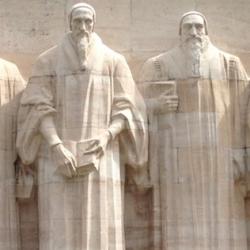In his 1908 treatise on Passing Protestantism and Coming Catholicism, Newman Smyth posed what he considered the decisive question about Protestantism: “to what extent are the Protestant churches losing control of the forces of life? . . . Is it mastering the controlling forces of life?” (13).
His answer was No. By comparison with the Catholic Church’s “undisputed control over whole spheres of human life” (14), Protestantism is culturally and politically weak. Family life used to be structured by the church’s sacramental life, but Protestantism “has too seldom such inherent and inherited authority among its own free families” (16). Further, “Protestant churches are not maintaining their influence over considerable areas of thought. It is not simply that worldliness and unbelief are coming in; but much religion is withdrawing from the churches” (17).
Protestantism hasn’t been able to hold the church itself together. Smyth displays more than a touch of early 2oth-century nostalgia for things medieval, but his charge still stings: “The ruins of a former Universal Church are not to be viewed as one might the failure of some social ideal to realize itself, as Plato’s republic remained an unsubstantial ideal of ancient philosophy. What we have to con template is the disappearance of a Church unity which once had taken form and be come visible on the earth. And if withal the spirit of it should vanish, that would be irrep arable loss. But just this is the religious peril of our divisions; the ideal of the one Church wanders among us, like an unembodied spirit, from church to church, until we almost cease really to believe in it. The ideal is put far from us as a millennial dream; it fades from our ordinary religious thought as a momentary glory passes from the evening sky. The all too common unbelief in this supreme ideal is witnessed by the complaisance with which even broad-minded men in all the churches are contented to welcome lower and beggarly substitutes for it” (23-24).
Does all this matter? Couldn’t we say that Protestant doctrine is true and vibrant, even if the social and political location of Protestantism, its cultural and intellectual centrality has been lost?
Smyth didn’t think so: “Christianity must be come the mastery of human life, or it is not the final religion. If our existing forms of religion are losing such control, we must look for another coming of the Son of man as one having authority” (14). A Christianity that no longer has authority to form culture, even the culture of its members, has not made good on the promise of the gospel itself.















